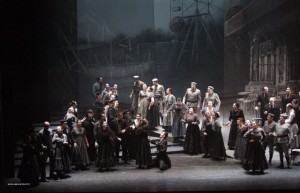A Gothic etching come to life – science, religion, sensibility (in the Romantic sense of the word), and Satan meet in Charles Gounod’s Faust. The 151 year old opera, directed by Paul-Emile Fourny, premieres at the Israeli Opera on Tuesday, February 9, with Paata Burchuladze and Vladimir Braun alternating in the role of Mephistopheles, and Omer M. Wellber conducting.
The timeless story of a scholar disillusioned by his endeavors and tempted by the devil to seek a life of sensual pleasures, is given a nuanced interpretation by Fourny. The battle of good and evil is portrayed in all the shades of gray, the visual representation merging with the music, inviting reflection as it delights the senses. Gounod uses songs within the opera as plot elements. The devil works his magic mainly through the power of music. Burchuladze, as heard in the general rehearsal for the opera, is a seductive devil indeed, resplendent in velvet suit complete with hat and cane. When Mephistopheles sings a chanson mocking religion and calling for people to unite around the golden calf (Le veau d’or) he easily holds the world in thrall with his voice. He later sings an ironic serenade (Vous qui êtes l’endormie) to lure Margaurite outside – with disastrous results for her brother Valentin.
The exquisitely structured production sets up several parallels that resonate strongly. We first glimpse Faust in the infirmity of old age, confined to a wheelchair, much as his intellect and desire is captive within his feeble body. Once he signs the contract with Mephistopheles, he rises from the chair, infused with youth and vigor. Margaurite, whom we first see as an innocent girl, moving freely as she sings, her every gesture in harmony with nature, is seduced then abandoned in the latter part of the opera. Heavily pregnant, she lowers herself into the rocking chair, confined by her suffering. Jewelry proves to be the undoing of both Margaurite and her brother Valentin. While he dies upon removing his blessed medallion that has kept him safe throughout the war, she begins her condemnation by allowing herself to be seduced by the jewels Mephistopheles left for her in Faust’s name.
Two of the most dramatic moments in the opera are sung unaccompanied, with the dramatically lacking orchestra drawing all attention to the words. Valentin curses his sister with his dying breath, the curse of eternal damnation dramatized by the lack of the orchestra. Margaurite sings alone as she successfully resists the temptation offered her by Faust, symbolizing her standing alone against the workings of the devil. Not every woman can take on Satan a capella. Noemi Nadelman in this role conveyed a haunting vulnerability that was all the more poignant in the strength of her conviction and the power of her voice.
In the first half of the opera, the orchestral Ent’ractes (French – music between acts) are made up of ominous chromatic movement. Before the first act this movement is upwards, symbolic of Faust’s rebirth. Later, as things are not going too well for the protagonists, this same motif is inverted and presented downward, symbolizing their descent into damnation. War is the understated backdrop to the opera and in the second half these preludes take on a military air, starting with the return of Valentin from war, and later representing Mephistopheles’s strength and the turmoil he causes.
It’s almost worth selling your soul to see this one.
By Ayelet Dekel and Asher Krim
Faust
The Israeli Opera, 19 Shaul HaMelech Blvd. Tel Aviv
Tickets: 03-6927777, kupa@tapac.org.il
Performances: 9.2, 11.2, 13.2, 15.2, 17.2, 18.2, 22.2, 23.2 at 20:00
12.2, 19.2, 26.2 at 13:00
The opera will be sung in French with English and Hebrew surtitles
Duration: 3hours and 15 minutes with one intermission
AYELET DEKEL






